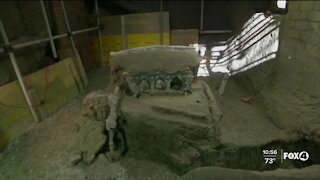Premium Only Content

Microbe discovered in evolutionary stasis for millions of years
#science #biology #evolution #bacteria #pangaea
It's like something out of science fiction. Research has revealed that a group of microbes, which feed off chemical reactions triggered by radioactivity, have been at an evolutionary standstill for millions of years. The researchers stated that these microbes hardly changed since the breakup of supercontinent Pangaea, about 175 million years ago, and they appear to be living fossils from those days. It was hypothesized the standstill evolution is due to the microbe's powerful protections against mutation, which have essentially locked their genetic code. If the researchers are correct, this would be a rare feature with potentially valuable benefits in biotech applications, such as DNA sequencing, diagnostic tests, and gene therapy.
References:
http://dx.doi.org/10.1038/s41396-021-00965-3
1 minute science, weekly dose of science, science news, science news 2021, science news podcast, science news story, science news direct, science news today, science news update, science, science experiments, science experiment, living fossil, living fossils, evolution, bacteria evolution, bacteria, evolution of bacteria, DNA repair, dna repair mechanism, dna repair mechanisms, dna repair frequency, DNA damage, dna damage and repair, microbe, microbes
-
 0:24
0:24
KTNV
4 years agoPandemic costs Americans millions of years of life
47 -
 0:54
0:54
Pelmorex_Eng
4 years agoA bizarre 'winged' shark swam in the Gulf of Mexico millions of years ago
-
 0:05
0:05
Alex8506
4 years agoMillions milliona
1531 -
 0:15
0:15
WFTX
4 years agoAncient chariot discovered
6551 -
 3:06
3:06
DrivingUsCrazy
4 years agoRottie discovered waves
24 -
 2:48:34
2:48:34
Adam Does Movies
13 hours ago $2.89 earnedAll The Big Movie Announcements From CinemaCon 2025- LIVE!
38K -
 1:07:30
1:07:30
Josh Pate's College Football Show
6 hours ago $3.53 earnedBig CFB Changes Coming | USC + Texas + Alabama In 2025 | Truth About Officiating | I Am Engaged
39.5K1 -
 4:43:40
4:43:40
Biscotti-B23
9 hours ago $1.79 earned🔴 LIVE VIEWERS VS MEMBERS BEEF 🔥 FINDING A NEW MAIN ⚔ BLEACH REBIRTH OF SOULS
28.3K2 -
 3:21:55
3:21:55
DTDUBtv
6 hours agoOUTLAST TRIALS WITH SARAHSLOTH17
26.8K -
 LIVE
LIVE
Major League Fishing
5 days agoLIVE! - MLF Bass Pro Tour: REDCREST - Day 4
6,280 watching